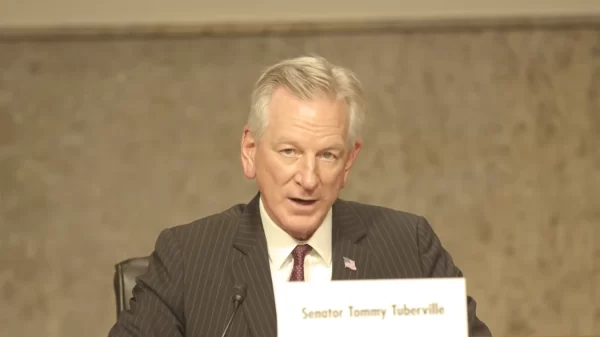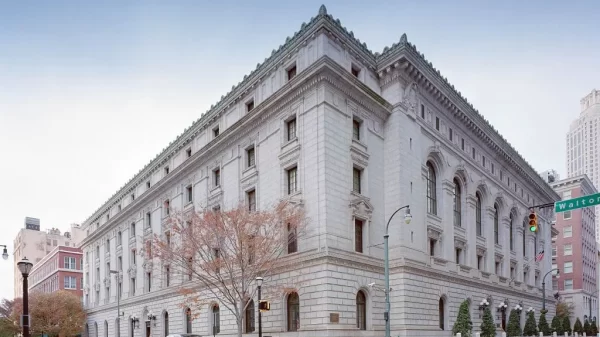|
Getting your Trinity Audio player ready...
|
Medical cannabis producer, Alabama Always LLC, on Friday, filed legal action against the Alabama Medical Cannabis Commission in Montgomery County Circuit Court, requesting a temporary restraining order and preliminary injunction. The company seeks to halt the commission’s current licensing process, which it claims relies on an “illegal scoring system.” The firm advocates for a more transparent application process, adherence to the Darren Wesley “Ato” Hall Compassion Act (commonly known as the Compassion Act), and ensuring applicants meet specified requirements before being awarded licenses.
In the new court filings, Alabama Always argues that the Compassion Act was enacted with the primary intention of swiftly making medical cannabis available to those in need in Alabama. The statute mandates that to acquire a license, a firm must demonstrate its capability to begin cultivation within a short 60-day timeframe after approval, Alabama Always argues.
Alabama Always alleges that the commission deviated from its initial rules and, without proper public input, introduced a new scoring system that overlooked the actual capabilities of applicants, focusing more on detailed documentation.
The lawsuit contends that the revised scoring methodology overly emphasized complex paper submissions, neglecting the primary mandate of the Compassion Act: prompt cultivation readiness. According to the company, this alleged oversight resulted in awarding licenses to ill-equipped firms, further stalling the provision of medical cannabis to waiting patients.
Alabama Always’s accusations don’t end there. They’ve highlighted discrepancies in the commission’s scoring approach, including inconsistent grading among evaluators, irrelevant scoring metrics (like vehicular specifics), and an impractical 10MB restriction for application files, which reportedly caused multiple technical disruptions.
Furthermore, the lawsuit emphasizes the company’s commitment to the initial expectations, having invested over $7 million in an advanced integrated production facility. With capabilities to initiate cultivation within a mere 15 days of receiving a license, Alabama Always accentuates its alignment with the Compassion Act’s core intentions.
In its filing, Alabama Always also contends that the commission’s actions violate the Alabama Administrative Procedure Act (AAPA) by not providing proper public notice and not adhering to rule-making protocols. The filing argues that several of the commission’s actions, from the rollout of application guidelines to the introduction of specific scoring metrics, infringe on the AAPA’s statutes. Moreover, even if these rules were lawfully set, they seemingly clash with the Compassion Act’s directives, according to Alabama Always’s lawsuit.
As a remedy, Alabama Always advocates for a total overhaul: annulment of the commission’s previous licensing determinations, abandonment of the current scoring methodology, and establishing a system in line with the Compassion Act’s original intent. They also push for unmasking application data to ensure transparency and fairness during the evaluation process.
Alabama Always says its legal challenge isn’t just a corporate tussle; it’s about safeguarding the broader public’s welfare. With medical cannabis being a lifeline for many Alabamians, it’s paramount to expedite its accessibility, embodying the Compassion Act’s aspiration.
The company maintains that whether it’s through legal adjudication or mutual settlement, the focus remains clear: instituting a licensing system that’s just, transparent, and most importantly, aligned with the needs of Alabama’s residents is the only fair path forward.
The suit lays out specific remedies the company is seeking:
- Declaring the Commission’s awards of licenses at its June 12 and August 10 meetings null and void;
- Enjoining the use of the scoring process, including exhibits from the applications, because the entire scoring process created an unnecessarily complicated and daunting system that frustrated the requirements of the Compassion Act;
- Enjoining the use of the scores resulting from the process and instructing the Commission to ignore prior scores related to the scoring process;
- Requiring that the Commission devise and follow a system that properly effectuates the Compassion Act’s intent, including the critical requirement that the licensees demonstrate the ability to commence cultivation within 60 days;
- Requiring that the Commission, all other things being equal, award
licenses to applicants who in its judgment, demonstrate the ability to
commence operations and reach full capacity the earliest; - Declaring invalid the “rules” set out in the second amended complaint, including but not limited to the Commission’s 10MB limitation, workaround and its inconsistent application to various applicants, the application guides, scoring system, scoring guide, evaluation materials, the fee to obtain a public investigative hearing, the engagement of administrative law judgments, the request for an investigative hearing,
and investigative hearing procedures; - Requiring the Commission to adopt rules and regulations in compliance
with the AAPA, including § 41-22-4 of the AAPA and the AAPA’s contested
case provisions; - Requiring the Commission to enforce the Compassion Act’s requirement
that licensees have obtained a $2,000,000 performance bond; - Requiring the Commission to unredact all application information except personal identifying information, personal financial information, and
legitimate trade secrets; - Prohibiting any future meetings of the Commission, including discussions
of applicants and applications in open or closed sessions, that fail to comply
with the AAPA’s contested case provisions; and - Awarding Alabama Always costs, interest, and any other equitable and/or legal relief to which it is entitled.
The legal motion by Alabama Always underscores the importance of adhering to established procedures when introducing and managing medical cannabis legislation. With Alabama’s patients in need of timely access to medical cannabis, the hope is that a swift resolution will ensure that the most qualified entities are at the helm of cultivation and distribution.






















































